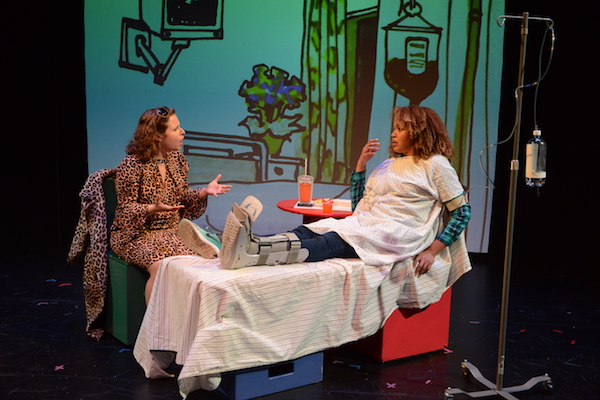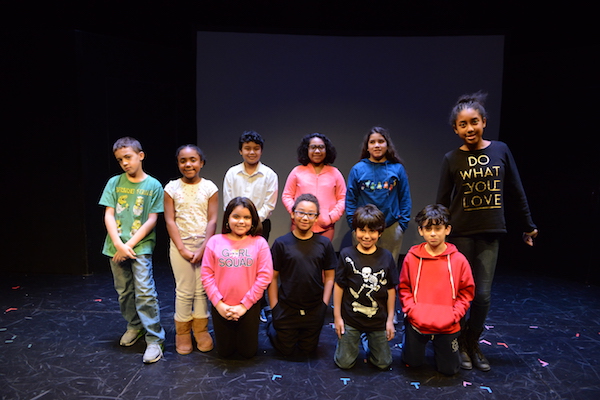
BY REBECCA FIORE | Adult themes of compassion, redemption, and solidarity ran through “Stirring the Pot: The Spicy Plays” — 10 short works for the stage written by kids and performed Dec. 8-10 by professional actors, as part of the 52nd Street Project’s Playmaking program.
The Playmaking program is the first of many available to kids up until the end of high school at The 52nd Street Project (52project.org). Ten children, five boys and five girls, are selected for a nine-week playwriting course. They must be nine or 10 years old at the time of application, and are required to reside in Hell’s Kitchen. Playmaking has two public performances a year, in December and March, at the 150-seat Five Angels Theater, located within the 52nd St. Project; 789 10th Ave., between W. 52nd & 53rd Sts..
Kat Almirañez, who teaches the Playmaking course and serves as the Project’s associate artistic director, said she starts the children off with writing about things they’re familiar with, and learning to write from different perspectives.
Alexander Brenton, 10, was inspired by Peeps, those soft Easter-time marshmallow treats. In his play, “Heaven on Earth,” an angel and a devil fight a kingdom of Peeps. The angel, Halo, understands in the end that when he crushes all the Peeps and kills the devil, that he’s finally “happy but lonely.”
Alex Torres, 10, wrote a play appropriately titled “Soccer” about Hiro, a young Brazilian soccer player who discovers his soccer ball, Zach, can speak. At first, Zach wishes he could be a different kind of ball — but when he starts helping Hiro win games (with impressively high scores of 30-22), he realizes he “doesn’t need to be another ball to be great.”
Torres said he “had a million ideas” for his play and was inspired by his favorite sport. He also said he wants to continue writing plays and one day become a Smart Partner, a one-on-one program the theater provides where mentors meet once a week with a child for 90 minutes.
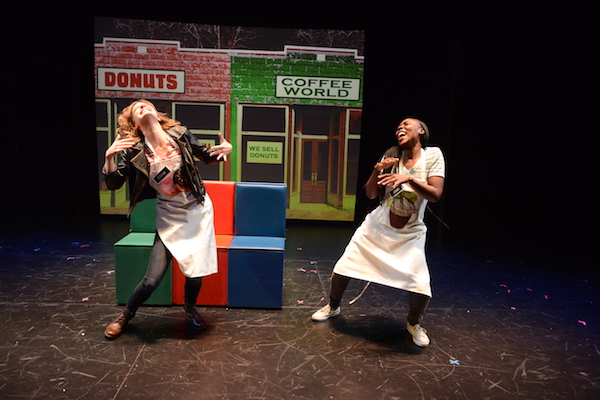
After the Playmaking program finishes, Almirañez said that the children become full members of The Project — giving them access to playwriting, acting, and set design programs, and even help with homework.
John Sheehy, director of institutional advancement for The Project (and an actor in one of the plays), has been working for the theater for almost 20 years, and is now mentoring the children of former Playmaking members.
“We have a pretty high retention rate,” Sheehy said. “Over 90 percent who complete the gateway program will do more than one program, and 75 percent will do more than that.”
Following in her older sister Jasmine’s footsteps, Melanie Correa, 9, applied to the program. She knew exactly what she wanted to write about, she noted, because she loves thinking about her friendships.
“I’m really close to my best friend and I love my mom,” she said. Her debut “Happy Mother’s Day” is a sharp drama about a 19-year-old who, after she learns her best friend’s mother has passed away, understands why her friend doesn’t have any Mother’s Day plans.
“Even though you hold a lot of things in, you’re still my best friend,” Correa’s character Chloe Capintone, played by Charlotte Graham, sang.
At the end of the course, each young playwright is matched up with two actors and a dramaturge/director, who also mentors them through the weekend retreat, helping them write their plays. For this show, the kids stayed with host families in upstate Stone Ridge.
Like many others, the weekend getaway was Amirah Hancock’s favorite part of her experience.
“I’ve never been on a trip with my friends for three days. We got enchiladas, ate chocolate cake, and went roller skating,” Hancock, 11, said.
Hancock’s play, “The Doll and the Pendant,” was a comedy about Maddie, daughter of the evil Malli (played by Sheehy), who is forced to kidnap Princess Surray — but befriends her instead.
“Did you talk to Ivan? I’m the better roller skater,” Hancock said.
Ivan Garcia, 10, wrote “A Wish.” One of the evening’s more abstract plays, it’s “about a giant who wants to be a snowman and they [both] regret it after,” Garcia said.
Neil D’Astolfo, who plays Ginormous, said he admires the level of creativity each child posses.
“There’s so much imagination at play,” he said. “[The actors] talk about it seriously. We want to honor their story. There is this pressure because we want to do it the way it was imagined, with generosity and compassion.”
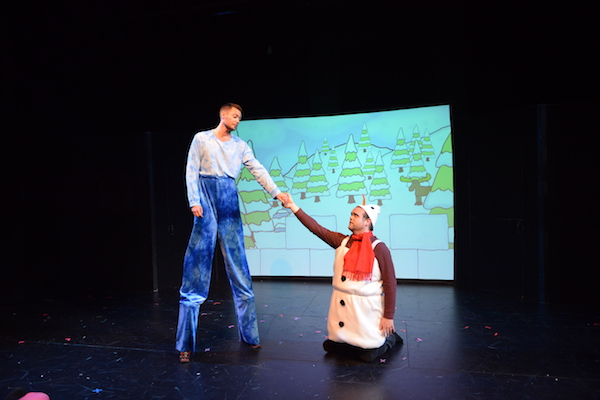
There were some challenges, D’Astolfo said. Each play has a song, written by the child and composed by music director Avi Amon, that he has to become more comfortable singing on stage, especially a high note, high above the ground.
“I’m a giant so of course I’m on stilts,” he said before the show, “But I’m not a singer. I have to sing a song and I’m terrified, not just because of the hitting the high note, but there’s a reason and emotion behind it. There’s no room for ego here.”
Greg Hildreth, who plays Snowy Snowman, said as an actor he applies the same principles to his job — as if he didn’t know it was the work of a young playwright.
Hildreth, who has been participating in the program for about six years said, “I’ve done a lot of different [children’s] programs, but the playwrights are on stage with you. We get to watch them watch their work. We get to see them realize their potential and see what art they have created.”
For every performance, each of the playwrights sits at a desk, cast under a spotlight facing the audience. Sheehy said that even though the formatting for the program stays the same, “the content is always exciting, always expanding.”
Well-known actors often lend their talents to Playmaking performances. This time around, three-time Emmy Award-winner Edie Falco played Sofia, a coffee shop worker who wants to cook for George Lucas’ “Star Wars”-themed restaurant, in “Jabba the Hutt” (written by Evaluna Santoni, 10). Emmy Award nominee Bill Camp played Bob, the rowdy half of a pair of friends searching for treasure and fighting off alligators, in the “Sewer Break-Up” (written by Liam Petard, 10).
“We get a lot of working actors, some on Broadway, some Off-Broadway, some regional, some emerging from graduate programs,” Sheehy said. “But they are all unified by the idea of realizing a kid’s vision.”
Almirañez noted that she does not censor the children and wants to give them complete freedom in writing, which they may not have in school or otherwise.
“What is written on paper is what we have,” she said. “Some of the language, there’s an extra ‘s’ or ‘-ed’ at the end of words, but the actors are committed to that. We do discourage cursing, but there is a beep in one of the shows, which is a big deal.”
Petard’s play featured a “What the [BEEP]!” from Steven O’Reilly, who played Bob’s best friend, Mike, after Bob aggressively danced around the theater, leaving him alone in the sewers.
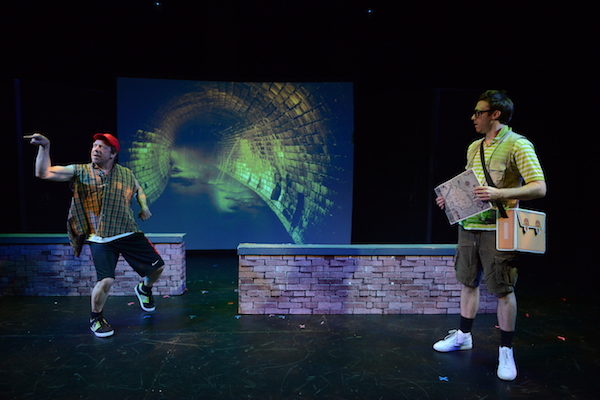
Family dramas such was “The Bad Uncle,” written by Xavier Espinal, 10, and “Stay,” written by Kylee Chester, 9, are two different takes on the challenges of being a twin.
“It’s about an uncle who doesn’t treat his niece fairly, he likes her twin more than her,” Espinal said. The play reveals the uncle and his niece may have more in common than they think, having both been ignored growing up. But the two come together and settle their differences, singing “We’re Different” but realizing they are the same.
Chester said she was intrigued by the idea of twins, since her mother is one. In her play, twins Miley and Riley have conflicting opinions on whether or not they should go find their mother, who abandoned them when they were little, after their father dies.
“My actors just got everything! All the emotion. They were on point,” she said.
Sarah Lopez, 10, said she was influenced by soap operas for her play “Hollywood is Harsh,” which centers around a young poor woman who breaks her leg while trying to make it big (in hopes that she can find her family), and a rich woman who befriends her, then realizes money can’t buy a family.
The playwrights packed a full house on Dec. 8’s opening night. All the actors and crew members work pro bono, as everything in the Playmaking program is free, including the shows. Sheehy said that theater can be an expensive and exclusive art to many — but everyone is welcome.
As The Project’s founding artistic director, Willie Reale, once said, “There is no way to fast forward and know how the kids will look back on this, but I have seen the joy in their eyes and have heard it in their voices and I have watched them take a bow and come up taller.”
